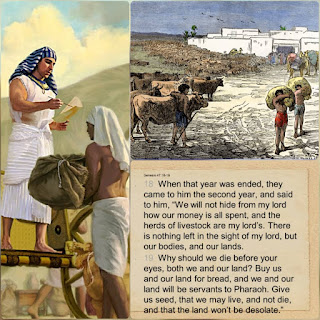JOSEPH #21 | JOSEPH IN EGYPT #3 | JOSEPH BUSINESS STRATEGIES#2
Pastor Christopher Choo
Lesson 3617
JOSEPH #21
JOSEPH IN EGYPT #3
JOSEPH BUSINESS STRATEGIES#2
One key trait of Joseph's success as a business administrator is his sole dependence on God. In Egypt he had no real friends nor family - only God to fall back on as his security net.
He had to learn fast to survive - to sink or swim with Egyptian crocodiles in the land of the Nile.
1. Step 1
During the seven years of abundant harvest, Joseph had the grain stored in cities (Gen. 41:48-49). During the seven lean years that followed, Joseph dispensed grain to the Egyptians and other people who were affected by the widespread famine.
To create and administer all this, while surviving the political intrigue of an absolute monarchy, required exceptional talent and favor with men - both blessings of which came from God.
2. Step 2
After the people ran out of money, Joseph allowed them to barter their livestock for food.
This plan lasted for one year during which Joseph collected horses, sheep, goats, cattle, and donkeys (Gen. 47:15-17).
He would have had to determine the value of these animals and establish an equitable system for exchange.
3. Step 3
When food is scarce, people are especially concerned for the survival of themselves and their loved ones.
Providing access to points of food distribution and treating people even-handedly become acutely important administrative matters.
When all of the livestock had been traded, people willingly sold themselves into slavery to Pharaoh and sold him the ownership of their lands as well (Gen. 47:18-21).
From the perspective of leadership, this must have been terrible to witness and unacceptable to our modern notions of slavery and human abuse.
Joseph, however, allowed the people to sell their land and to enter into servitude, but he did not take advantage of them in their powerlessness.
Joseph would have had to see that these properties were valued correctly in exchange for seed for planting (Gen. 47:23). He enacted an enduring law that people return 20 percent of the harvest to Pharaoh.
This entailed creating a system to monitor and enforce the people’s compliance with the law and establishing a department dedicated to managing the revenue.
In all of this, Joseph exempted the priestly families from selling their land because Pharaoh supplied them with a fixed allotment of food to meet their needs adequately (Gen. 47:22, 26). Handling this special population would have entailed having a smaller, distinct system of distribution that was tailored for them.
What spiritual lesson do we glean from today's lesson?
By applying his God-given skill, wisdom, and favour with men, Joseph successfully brought Egypt through the agricultural catastrophe.
When the seven years of good harvests came, Joseph developed a stockpiling system to store the grain for use during the coming drought.
When the seven years of drought arrived, “Joseph opened the storehouses” and provided enough food to bring the nation through the famine.
His wise strategy and effective implementation of the plan even allowed Egypt to supply grain to the rest of the world during the famine (Gen. 41:57).
In this case, God’s fulfillment of his promise that Abraham’s descendants would be a blessing to the world occurred not only for the benefit of foreign nations but even through the industry of a foreign nation, Egypt.
It is significant that only after blessing other nations was Israel blessed.
God did not raise a saviour in Israel but Joseph in Egypt.
This point is often overlooked - that God’s blessing for the people of Israel came only after and through His blessing of foreigners.
For - as we just observed - God did not raise up an Israelite in the land of Israel to provide for Israel’s relief during the famine. Instead, God enabled Joseph, working in and through the Egyptian government, to provide for the needs of the people of Israel (Gen. 47:11-12).
Do we put the needs of others first before our own? In our prayers, do we pray for God's blessings upon ourselves and loved ones to the exclusion of others?

